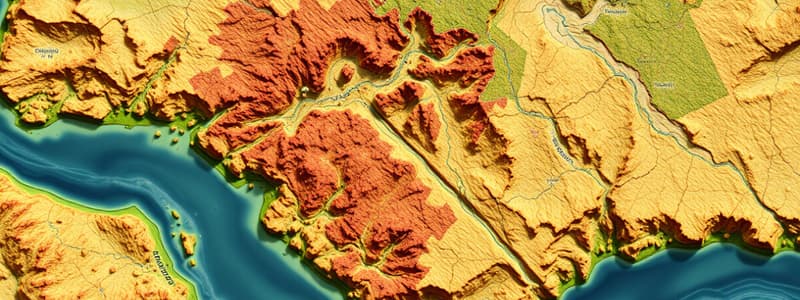Podcast
Questions and Answers
What is the primary focus of human geography?
What is the primary focus of human geography?
- Natural landforms and ecosystems
- Human activities and their impact on the environment (correct)
- The history and structure of the Earth
- The arrangement of physical features
Which of the following technologies is NOT a part of geospatial technology?
Which of the following technologies is NOT a part of geospatial technology?
- Global Positioning System (GPS)
- Remote Sensing
- Climate Modeling (correct)
- Geographic Information Systems (GIS)
What does the term 'topography' refer to?
What does the term 'topography' refer to?
- The art of map-making
- The measurement of atmospheric conditions
- The arrangement of natural and artificial physical features (correct)
- The study of population distribution
In the context of geography, what do latitude and longitude represent?
In the context of geography, what do latitude and longitude represent?
Which branch of geography examines natural processes such as weather and landforms?
Which branch of geography examines natural processes such as weather and landforms?
What is the significance of geospatial technology in disaster management?
What is the significance of geospatial technology in disaster management?
Which term best describes the study of the effects of geography on international politics?
Which term best describes the study of the effects of geography on international politics?
What role does geographical information science (GIScience) play in the study of geography?
What role does geographical information science (GIScience) play in the study of geography?
Flashcards are hidden until you start studying
Study Notes
Definition
- "Geo" is derived from the Greek word for "earth" and is often used in contexts related to geography, geology, and the study of the Earth's features and processes.
Key Concepts
-
Geography
- Study of the Earth's landscapes, environments, and the relationships between people and their environments.
- Divided into physical geography (natural features) and human geography (human activities).
-
Geology
- Science that deals with the Earth’s solid matter, including rocks, soils, and the processes that shape them.
- Involves the study of Earth's history and structure.
-
Geospatial Technology
- Tools and techniques for collecting, analyzing, and interpreting geographic data.
- Includes GIS (Geographic Information Systems), GPS (Global Positioning System), and remote sensing.
-
Geopolitics
- Study of the effects of geography (human and physical) on international politics and relations.
Applications
- Environmental Studies: Understanding ecological systems, conservation efforts, and climate change.
- Urban Planning: Designing sustainable cities using geographic data.
- Disaster Management: Analyzing natural hazards and planning emergency responses.
- Resource Management: Assessing natural resources availability and usage.
Important Terms
- Latitude and Longitude: Coordinate system used to determine locations on the Earth’s surface.
- Topography: The arrangement of natural and artificial physical features of an area.
- Cartography: The art and science of map-making.
Major Branches
-
Physical Geography
- Examines natural processes and patterns, such as weather, landforms, and ecosystems.
-
Human Geography
- Focuses on human activities, cultures, and their impacts on the environment.
-
Geographical Information Science (GIScience)
- Studies the theoretical concepts behind geographic information systems.
Importance
- Aids in understanding global issues such as climate change, urbanization, and resource distribution.
- Critical for informed decision-making in policy, environmental management, and economic planning.
Definition
- "Geo" originates from the Greek word meaning "earth," commonly associated with the fields of geography and geology.
Key Concepts
-
Geography:
- Examines Earth's landscapes and environments, as well as human-environment interactions.
- Split into physical geography (natural features) and human geography (activities and cultures).
-
Geology:
- Studies the Earth’s solid materials, such as rocks and soils, and the processes that shape them.
- Includes the exploration of Earth's history and structural evolution.
-
Geospatial Technology:
- Encompasses tools for gathering and analyzing geographic data.
- Key components include GIS (Geographic Information Systems), GPS (Global Positioning System), and remote sensing technology.
-
Geopolitics:
- Investigates how geography, both human and physical, influences international relations and political dynamics.
Applications
- Environmental Studies: Focuses on ecological systems, conservation efforts, and the impacts of climate change.
- Urban Planning: Uses geographic data to create sustainable urban spaces.
- Disaster Management: Analyzes natural hazards and develops strategies for emergency response.
- Resource Management: Evaluates the distribution and use of natural resources.
Important Terms
- Latitude and Longitude: A coordinate system that identifies specific locations on Earth's surface.
- Topography: Describes the physical features of an area, both natural and man-made.
- Cartography: The practice and science of creating maps and visual representations of geographic data.
Major Branches
-
Physical Geography:
- Investigates natural processes like weather patterns, landforms, and ecosystems.
-
Human Geography:
- Explores cultural practices, human activities, and their environmental effects.
-
Geographical Information Science (GIScience):
- Examines theoretical frameworks concerning geographic information systems.
Importance
- Facilitates understanding of global challenges such as climate change, urban growth, and resource management.
- Essential for making informed decisions in policy development, environmental management, and economic strategy.
Studying That Suits You
Use AI to generate personalized quizzes and flashcards to suit your learning preferences.




